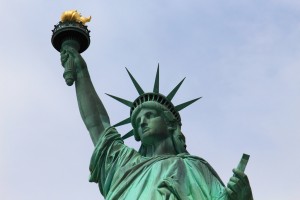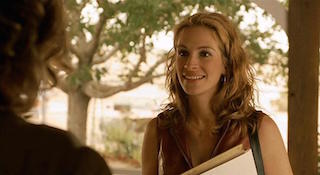Last week, social media was filled with posts by Americans criticizing their country, their leaders, and their political system. Perhaps for good reason. But today, the overwhelming sentiment is love for country and flags on every post; July 4 seems to bring out the patriotism in even the most anti-jingoist.
Independence Day seems to bring out the most patriotic in us all; bratwurst and fireworks aside, we love to love our country. And amid the hijinks and worry that our government and fellow citizens do not have our best interests at heart, we love to hate our country.
For a country seemingly built on the unambiguous promise of freedom, that’s quite a paradox.
The Love of Liberty
One of the core principles of Redeeming Culture is that the desires and loves of our hearts are not random, or at odds with the way we’re supposed to be; rather, they’re given by God as signposts to point us to Him. And our desire for freedom points to Him in some surprising ways.
For freedom Christ has set us free; stand firm therefore, and do not submit again to a yoke of slavery.
The Bible makes clear that freedom is the goal of Christ’s work on the Cross. This isn’t interpretation; Paul says as much in Galatians 5. But if we don’t know for certain what we were originally enslaved to, how can we rejoice in this?
 As usual, context is our key here. Where Paul tells us that it was “for freedom Christ has set us free,” he is reminding us that we were enslaved to sin from birth; a topic he explains more fully in the previous chapter: “Formerly, when you did not know God,” he says, “you were enslaved to those that by nature are not gods.” (Galatians 4:8, ESV) That is, the things you loved – the things you worshipped and gave your life for – you treated as gods, even though they have no power to fulfill you as God. And that worship enslaved you, working you to the bone to appease them without ever giving more than a pittance in return, chasing down joys that won’t fulfill you, pursuing satisfaction in the dry, dry desert as sin stalks us with a thirst for our blood.
As usual, context is our key here. Where Paul tells us that it was “for freedom Christ has set us free,” he is reminding us that we were enslaved to sin from birth; a topic he explains more fully in the previous chapter: “Formerly, when you did not know God,” he says, “you were enslaved to those that by nature are not gods.” (Galatians 4:8, ESV) That is, the things you loved – the things you worshipped and gave your life for – you treated as gods, even though they have no power to fulfill you as God. And that worship enslaved you, working you to the bone to appease them without ever giving more than a pittance in return, chasing down joys that won’t fulfill you, pursuing satisfaction in the dry, dry desert as sin stalks us with a thirst for our blood.
If you’ve only ever heard of “sin” as “doing bad things,” this may not look familiar to you; but in fact, this is sin. It comes to us, dressed up as freedom, with shackles and chains hidden behind its back.
We feel a desire for liberty because we know, in the heart that God placed into us, that we are not meant to live a life like that. We’re supposed to live a free life, not live enslaved to sin that would rather see us dead than happy! And so, in His mercy and love, Christ came to pay the penalty for that sin; he saved us and freed us, finally giving us true, eternal liberty.
The Need to Kneel
But Paul warns us that slavery is still a risk. Even though Christ’s work was perfect and eternal, we still run the risk of falling back into slavery. Even though our hearts long for liberty, they tend toward bondage. Like Loki says in The Avengers, we “will always kneel.”
 It’s a great paradox of our hearts that we have a need for both freedom and bondage; we pursue both liberty and slavery. This fails us most greatly when we use our freedom to step back into the shackles of slavery. But, like our desire for liberty, the need to kneel is given to us by God. We truly were made to kneel- but not to Loki, or the bondage of slavery, or to earthly kings, or to the government of our nation.
It’s a great paradox of our hearts that we have a need for both freedom and bondage; we pursue both liberty and slavery. This fails us most greatly when we use our freedom to step back into the shackles of slavery. But, like our desire for liberty, the need to kneel is given to us by God. We truly were made to kneel- but not to Loki, or the bondage of slavery, or to earthly kings, or to the government of our nation.
No, God gave us the desire to kneel because we’re supposed to kneel before Him. Not before a despot who craves our worship for pathetic reasons, but before the ultimate, most powerful, most glorious being in all existence, and because serving with Him is the greater purpose we seek, the greatest purpose we can attain. Christ set us free for freedom, so we could be free to work with Him!
Fealty and Freedom
Our goal in the end is not just to be servants of Christ, but to pursue God as a beloved Father. See, we weren’t just saved to become servants; earlier in Galatians, Paul says that we are saved and freed to be adopted into God’s family.
And here we reach another paradox of freedom. Perhaps the greatest one of all; Christ rescued us from slavery to sin, and gave us the liberty to swear fealty to God. But in doing so, He adopted us and made us family, not slaves!
What does this family do?
But the fruit of the Spirit is love, joy, peace, patience, kindness, goodness, faithfulness, gentleness, self-control; against such things there is no law. And those who belong to Christ Jesus have crucified the flesh with its passions and desires.
We’ve been freed and equipped to live lives marked not by slavish rule-following or simple church attendance, but truly transformed hearts that are loving, joyful, and peaceful. We can be patient, kind, and good to others without asking anything in return. We can be faithful and gentle without an agenda. And we can have self-control without being legalists because our passions and desires have been crucified with Christ and replaced, like our hearts, with desires that are being sanctified and turned toward God.
Enjoy your freedom today.
• • •
Happy Independence Day from Redeeming Culture!

